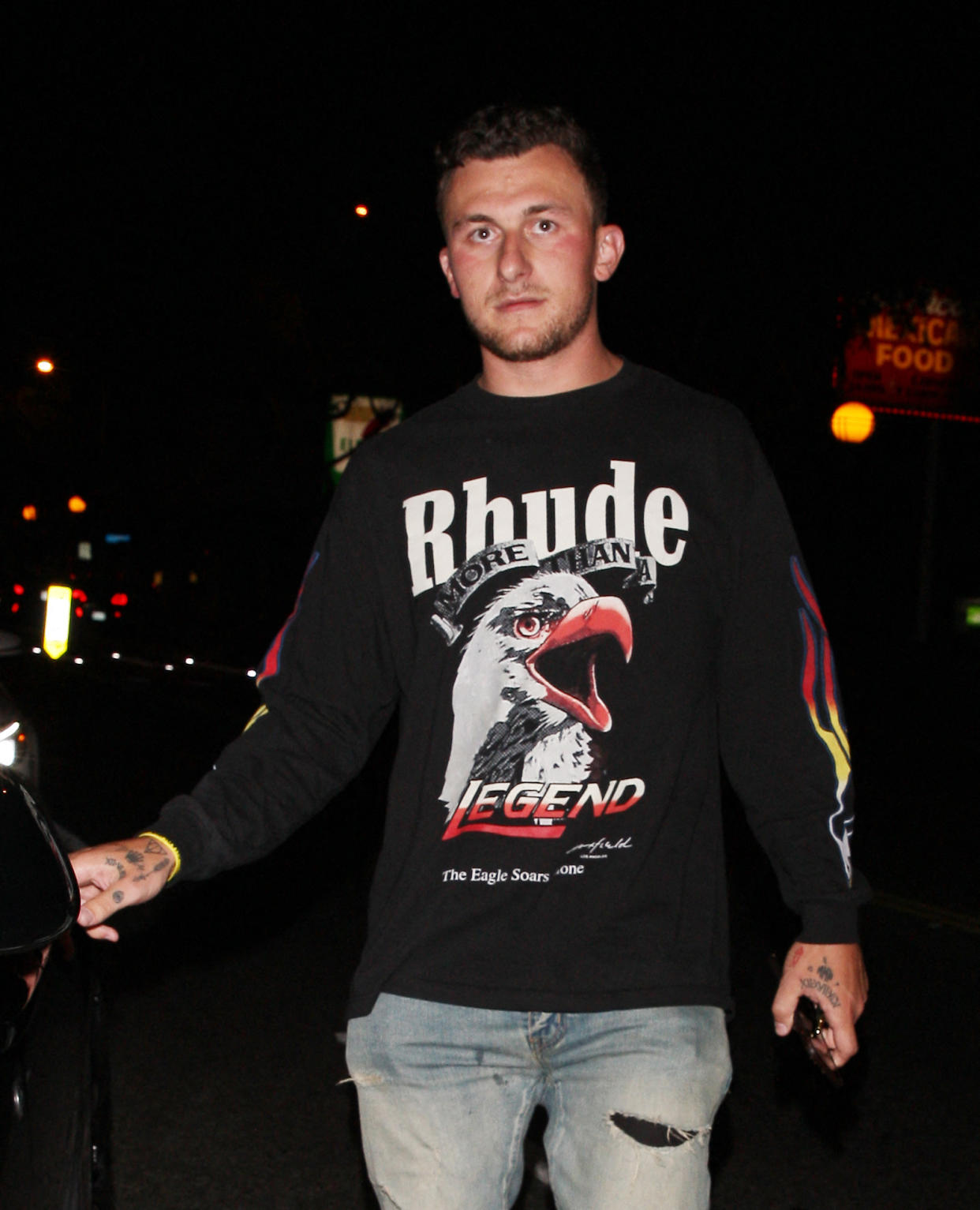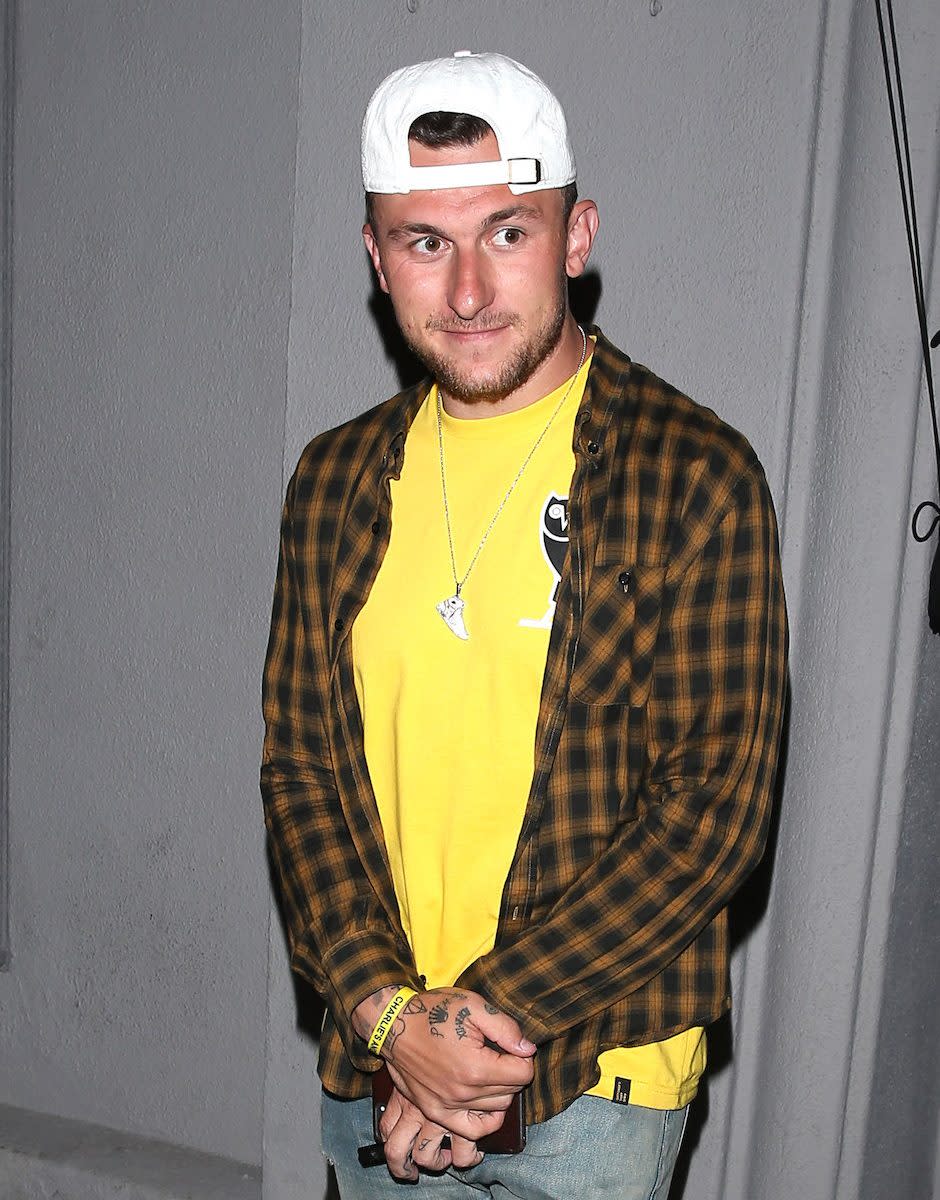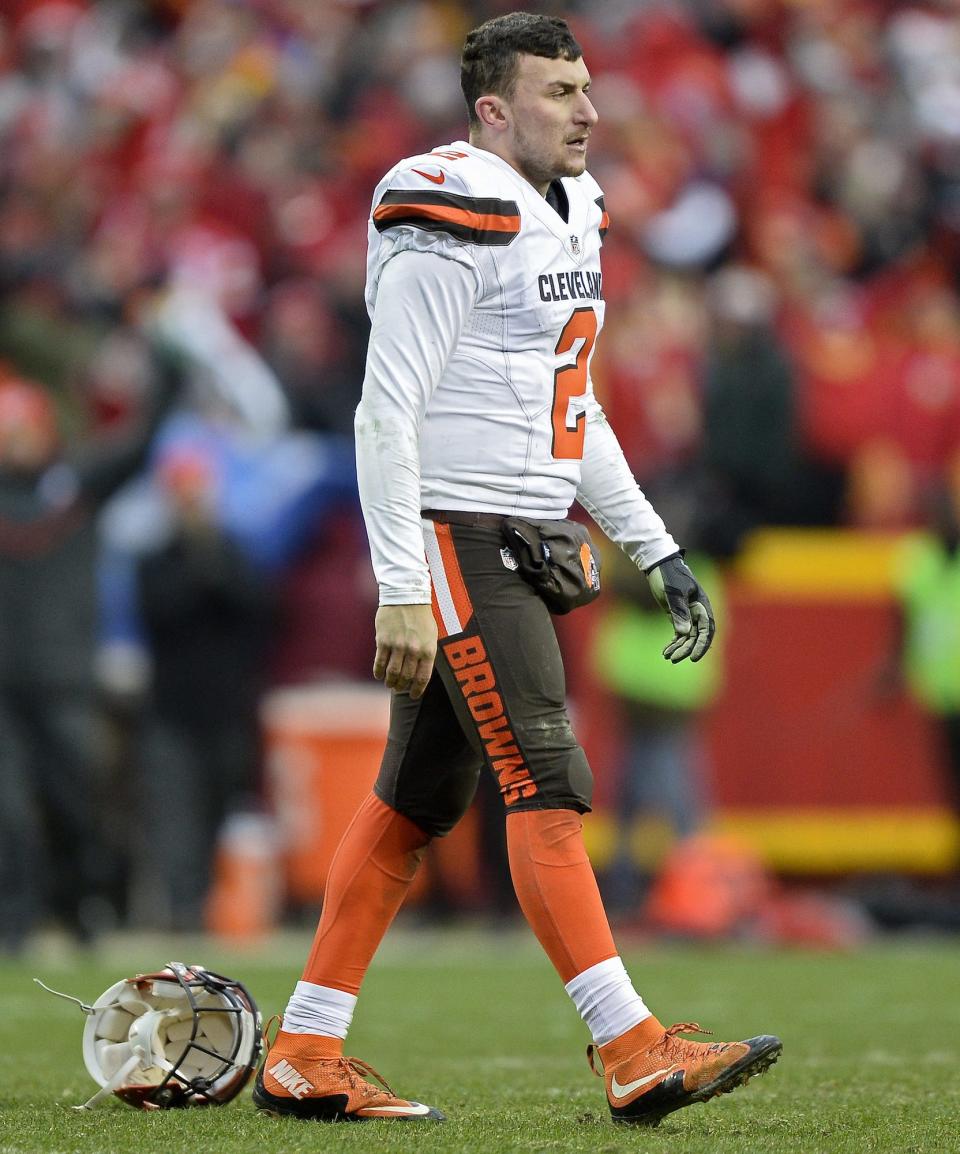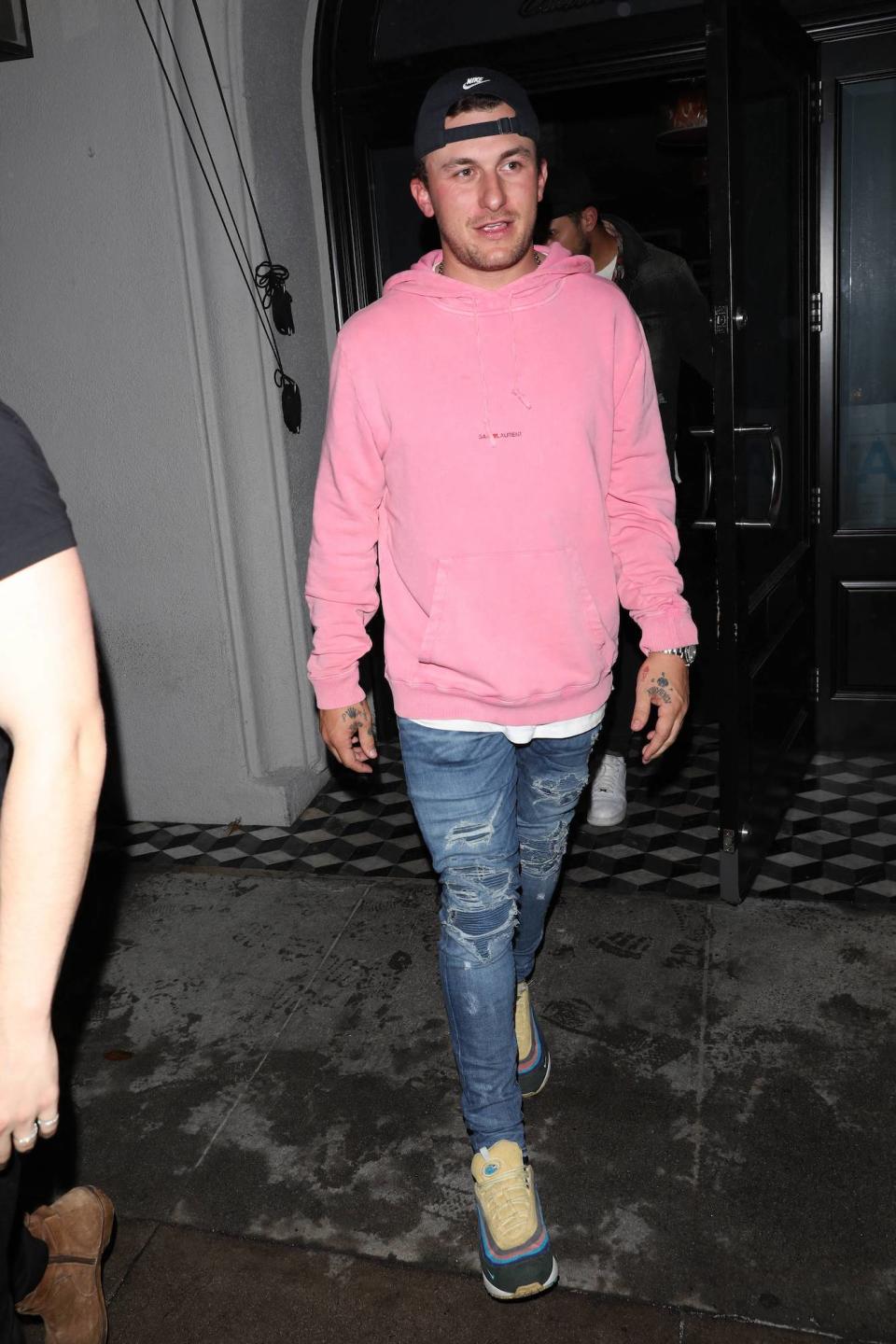Johnny Manziel Planned to Take His Life After $5 Million Bender: ‘Untold: Johnny Football’ Recap

Johnny Manziel’s rise and fall transcended football — and he’s pulling back the curtain on his controversies and mental health struggles for the first time in Netflix’s Untold: Johnny Football.
Texas A&M fans may remember Manziel’s college career got off to a rocky start when he was arrested weeks before his first game as the football-crazy school’s quarterback. The incident marked the first of many controversies to come.
“I don't have much of a recollection other than waking up shirtless on a concrete bench in Bryan County Jail,” Manziel, who was booked for a fake ID after a fight, told Netflix cameras. “[A&M’s statement] said, ‘That wasn't very normal for my character.’ … I guess looking back now, it was normal for my character.”
It wasn’t long into the 2012 season, however, before Manizel proved that he could perform on the field regardless of his hard partying. As a result, his coaches, as they later admitted, let him get away with whatever he wanted — and “Johnny Football” was born.
After leading the Aggies to a shocking victory against No. 1 ranked Alabama in November, Manziel recalled being treated like a celebrity on and off A&M’s College Station campus. “You walk off the field like a f—king G,” he said.
One month later, Manziel became a household name as the first freshman to win the Heisman Trophy, awarded every year to the country’s best college football player. While his outstanding play brought A&M a windfall in money and publicity — Manziel’s Heisman win was estimated to bring the university $37 million worth of free PR — he quickly grew frustrated that he wasn’t seeing any of that money himself.

“There were two times throughout the season where I had to sign hundreds and hundreds of autographs [for] our donors,” Manziel said of the events the university held to raise funds for a new stadium. “I was tired of not having any money and I sure as hell saw 45 million No. 2 A&M Adidas jerseys sold. It didn't make any sense, and I had a bone to pick.”
Manziel and then–best friend Nate Fitch opted to ignore NCAA rules that college athletes couldn’t profit off of their own likenesses and began selling autographs in January 2013. They made $30,000 on their first deal with an unnamed “king of all autographs,” who Fitch alleged Alex Rodriguez vouched for during a phone call.
The two BFFs subsequently began partying with A-listers including Drake, Rick Ross, Lebron James, Jessica Biel and Justin Timberlake. “None of them could believe [Johnny] was there,” Fitch said.
As a result of A&M advising freshmen not to talk to any media, Fitch fielded questions about Manziel’s sudden wealth, lying about his family being from “oil money.” The two men made more than $100,000 — they split the money 80/20 — before the NCAA began to investigate Manziel. Fitch and Manziel’s attempts to cover their tracks, which included trading the cash for checks from Manziel’s grandfather, proved somewhat successful as Manziel was suspended for only half a game and they continued their autograph business during the 2013-2014 season.
A&M, however, went 8-4 during Manziel’s sophomore season and the quarterback caught a lot of heat for his increasingly erratic behavior, which included skipping practice and showing up hungover. “F—k your practice. I’m the best player in the country,” Manziel recalled thinking. “Whether people like to say it or not, I was bigger than College Station.”
After the season ended, Manziel declared for the NFL draft — and Fitch and Manziel quickly had a falling out when the athlete signed with professional agent Erik Burkhardt.
“We had originally told [Nate] that there wasn't going to be a guy with me on a day-to-day,” Manziel said. “When we told him that wasn't gonna happen, kind of thing like he felt his role in the whole world was diminished kind of pulled away. I don't think we've spoken again since then. … I felt terrible about it, but at the same time because of what my track record was, they weren't going to allow me to do that.”
As he prepared for the NFL combine, a pre-draft workout in which teams judge former college players on their abilities, Burkhardt attempted to keep Manziel on the straight and narrow, drug testing him weekly. “I was really, really good until the week before the combine in Indy, and I finally just broke,” Manziel said, admitting he went to a party with rappers and actresses in L.A. “I woke up in a hotel room, and didn’t know how I got there.”

While Burkhardt wanted Manziel’s dad to fake a hospital trip to buy Manziel’s some time, the football player was confident he could drink enough water to get the drugs out of his system — which he claimed was his strategy while in college. Burkhardt later learned the Aggies’ fourth-string QB was submitting his own clean urine for Manziel.
Despite the close call, Manziel passed the test and nearly solidified a deal with the Houston Texans before he got drunk at the owner’s country club. Manziel was ultimately picked 22nd by the Cleveland Browns in the 1st round.
“When I got everything that I wanted, I think I was the most empty that I’ve ever felt inside,” Manziel said, noting that he didn’t feel any connection to his teammates in Cleveland.
Manziel admitted to watching zero game film and struggling on and off the field. “I would sit in my condo in Cleveland downtown and just feel like it was the only place that [I could] get away from everybody and anything,” he said. “And I would look out those windows, every day I just felt empty. I went from one fish bowl city to another and I wanted nothing to do with football.”
In 2015, his substance abuse issues spiraled again, and after he missed a game in early 2016 because he was partying in Las Vegas, he was officially cut by the Browns. Manziel subsequently went on what he described as the biggest bender yet, getting arrested after a fight with his then-girlfriend Colleen Crowley.
“Throughout that relationship, I was unfaithful. You know, we get into a heated, heated argument. You know she's trying to jump out of the car and …” he said before trailing off.

Manziel was dropped by his agent and estranged from his family.
“[It was] the first point in my life where I really ramped up my drug use to a constant, daily thing. I was mostly doing a lot of coke and taking Oxys,” he said. “I went from 215 pounds in January to 175 pounds by September. The wires in my head seem very twisted. I got diagnosed Bipolar, Then I felt like it was the same thing as being called an alcoholic or a drug addict.”
Manziel described his monthslong bender, on which he spent an astonishing $5 million, as “direct self-sabotage trying to burn this thing down.”
“I had planned to do everything that I wanted to do at that point in my life — spend as much money as I possibly could and then my plan was to take my life,” he said. “Months prior, I went and bought a gun that I knew I was going to use. I wanted to get as bad as humanly possible to where it made sense and it made it seem like an excuse and an out for me. Still to this day, don’t know what happened, but the gun just clicked on me.”
While Manziel concluded that he “couldn't fix” what happened “with Colleen, the NFL, with A&M” and “didn't have much of a relationship with my family,” he returned to Texas.
According to his sister, Manziel is still a work in progress.
“I think people do, maybe, worry about me sometimes, but I mean, that’s natural,” he concluded. “You know, I’ve given them reason[s] to do that.”
If you or someone you know is in emotional distress or considering suicide, call the 988 Suicide & Crisis Lifeline at 988.
